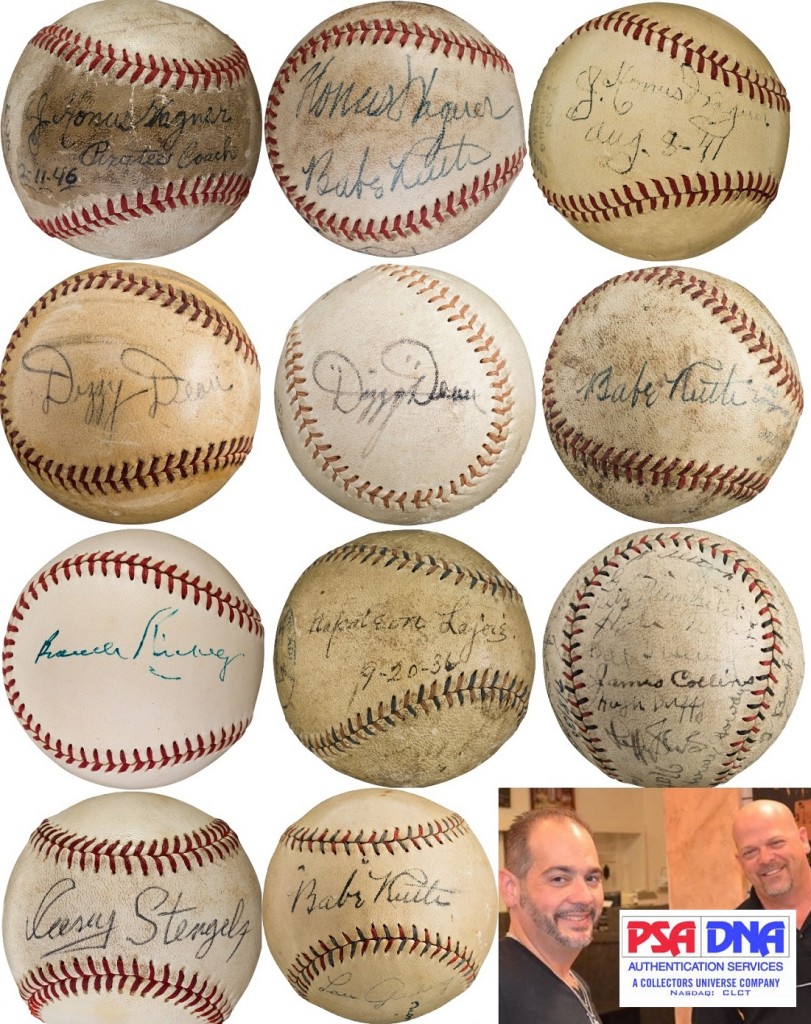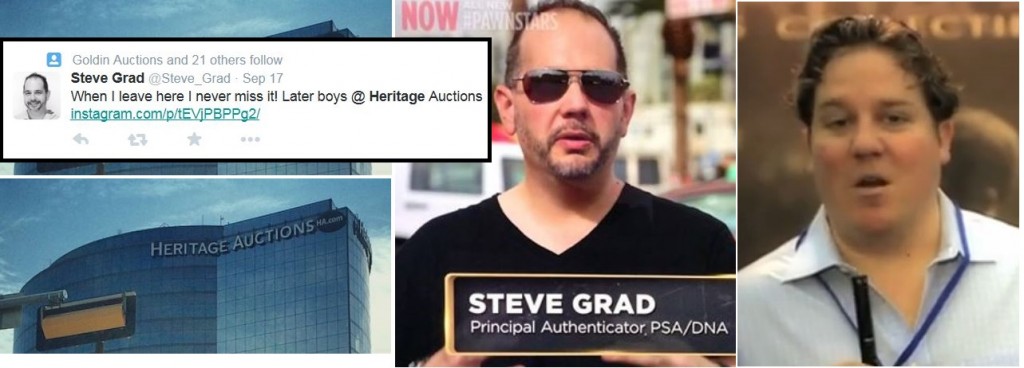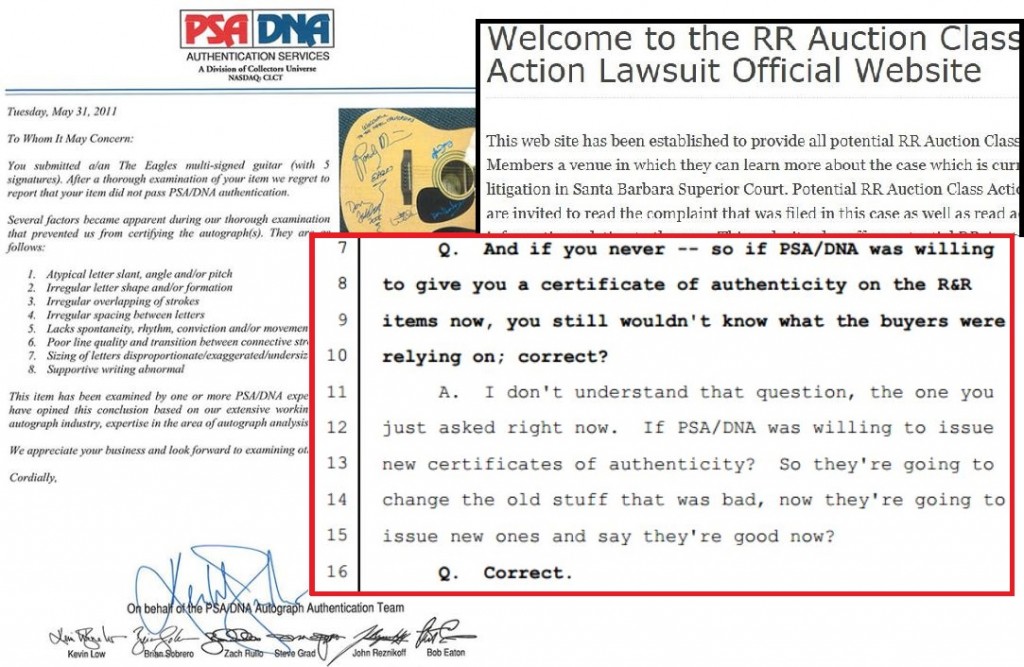By Peter J. Nash
November 6, 2014
 |
Last spring, Heritage Auctions sold a bogus letter alleged to have been written by 19th century Hall of Famer John M. Ward. The sale of the letter was a prime example of the auction house’s deceptive practices and its marketing of non-genuine autographed materials. Despite the fact that the Ward autograph was identified as a secretarial signature in a hobby reference book and in several reports published by Hauls of Shame, Heritage continued with the sale of the bogus document for close to $9,000 even though the letter was only worth a few hundred bucks.
Heritage continues its tradition of offering items that experts have questioned as fakes in its current sale which includes signed baseballs purported to bear the signatures of Honus Wagner, Dizzy Dean, Babe Ruth, Branch Rickey, Casey Stengel, Nap Lajoie and others. Our reports over the past few years have identified similar Heritage offerings which experts have opined were fakes but were accompanied by third-party authentication company certificates claiming they were genuine. As the world’s largest auctioneer of collectibles, Heritage moves an enormous amount of vintage material through the hobby but it appears that they offer more fakes than most of their competitors. The signed baseballs in the current sale are so substandard that the experts were aghast that the items were actually hitting the market with LOAs from PSA/DNA and their alleged expert Steve Grad.
So, why does Heritage attract so much material that experts we spoke with claim are forgeries and how do they get these questionable items authenticated?

Experts are of the opinion that the signatures on these baseballs being sold by Heritage are not genuine (or have been enhanced) but they have all been authenticated by PSA/DNAs alleged expert Steve Grad who also appears with Rick Harrison as an expert on Pawn Stars.
To answer that question one has to look no further than Heritage’s two in-house consignment directors, Mark Jordan and Mike Gutierrez who, before they had an affiliation with the auction giant, were the most prolific sellers and authenticators of forged materials in the hobby.
In addition to being the prime suspect in the massive thefts of genuine signed documents from the Baseball Hall of Fame in Cooperstown, Mike Gutierrez has also been linked to the authentications of numerous groups of fraudulent materials including scores of Babe Ruth secretarial signatures, the infamous Ty Cobb forgeries created by Al Stump, items attributed to the 90s forger known as Johnny Fang, numerous problematic items sold by Richard Wolfers Auctions and MastroNet as well as the sale of numerous forgeries to private collectors who returned materials to him and signed non-disclosure agreements in lieu of receiving refunds. From the late 1980s through the late 1990s Gutierrez was considered one of the leading authenticators of baseball autographs and was hired by numerous auction houses (including Sotheby’s) for his alleged expertise. Along with Jimmy Spence, Gutierrez was also responsible for authenticating many of the Babe Ruth forgeries that entered the marketplace through Mastro Auctions and have now been identified as the work of a forger who created the now infamous Ruth inscribed photograph to actor Gary Cooper.
Like Gutierrez, Mark Jordan, was also once considered a leading authentication figure in the hobby through the 1990s but fell out of favor with the hobby powers that be after he was linked to the authentications of hundreds of big ticket forgeries that were offered and sold by Richard Wolfers Auctions and Sports Heroes Inc. in the 1990s. Jordan authenticated dozens of forged single-signed baseballs for Sports Heroes and Wolfers in 1992 and some of those same baseballs are the subject of a current lawsuit filed against Mastro Auctions and Mike Gutierrez in Chicago that alleges Gutierrez authenticated forged baseballs for Bill Mastro and his former auction business. Jordan authenticated an entire collection of single signed baseballs around the same time that a forged letter from Red Sox owner Tom Yawkey surfaced stating that he had once owned a collection of rare signed baseballs from the likes of Jack Chesbro, John Ward, Cap Anson, Rube Waddell and others. (The current HA sale features a single-signed ball of Branch Rickey (shown above) that was part of Jordan’s problematic 1992 authentication for Jerry Zuckerman of Sports Heroes and it was also offered as Lot 56 in Wolfers’ 1992 “Treasures” auction). Jordan also authenticated dozens of other items alleged to originate from the estate of sportswriter Fred Lieb including alleged “game-used” baseball gloves and baseballs bearing forgeries of Cy Young, Josh Gibson, Ty Cobb and Walter Johnson.

HA consignment director Mark Jordan was once the leading authenticator in the hobby but he certified hundreds of forgeries that appeared in auctions during the 1990s including his certification of over 100 single signed balls including forgeries of Jack Chesbro, Sam Thompson, Tim Keefe, Josh Gibson and Amos Rusie (all inset).
Gutierrez and Jordan joined the staff at Heritage Auctions in 2006 as consignment directors and it is no surprise that they are responsible for referrals from their old customers and for the procurement of materials they have either sold or authenticated in the course of their hobby careers.
While Gutierrez and Jordan were once the final authority for many auctioneers in regard to the authentication of autographs, the formation of PSA/DNA in 1999 paved the way for the emergence of one of Jordan’s ex-employees at Mark Jordan Inc., Jimmy Spence Jr., who worked for PSA and later established his own authentication company now known as JSA.

Mark Jordan (inset) was the principal authenticator for Richard Wolfers Auctions in the 1990s and he certified many forgeries including baseball gloves bearing forgeries of Ty Cobb (top) and Josh Gibson (bottom).
Gutierrez has also worked for PSA/DNA in the past and is currently listed as an expert consultant for James Spence Authentication (JSA). Although Gutierrez and Jordan are employees of Heritage working under the auspices of HA sports director, Chris Ivy, the auction house relies primarily on the authentication services of PSA/DNAs lead authenticator, Steve Grad. According to his Twitter account, Grad spent September 16th and 17th authenticating materials slated for Heritage’s current sale. According to several sources, it was on this authentication trip to Dallas that Grad authenticated the questionable materials for the company that is considered one of PSA/DNAs biggest hobby clients. One source familiar with the autograph examination process told us, “There’s no way you can properly examine that volume of material in that short a period of time with just one guy.”
Heritage and Chris Ivy, however, appear to be comfortable with Grad’s solo skills as an authenticator despite his very public authentication mishaps which we’ve chronicled in detail in our Worst 100 report of 2013. They also appear to support Grad despite the revelations that he has misrepresented and lied about his education and also perjured himself in court ordered depositions in which he stated he was a college graduate when he has never graduated from any college or university.

Steve Grad (center) tweeted how he spent just two days authenticating items for Chris Ivy (right) and Heritage's current sale.
PSA/DNA is a subsidiary of the public company Collectors Universe (CLCT) and Grad has clearly violated the company’s “Code of Business and Ethical Conduct” which is published on the company website. Curiously, it appears that Collectors Universe has taken no action against Grad for his perjury under oath but that might be explained by language included in the company’s annual report for 2014 which was released to shareholders last month. In that report the company states they are “dependent on (their) collectible experts” and state:
“There are a limited number of individuals who have the expertise to authenticate and grade collectibles, and the competition for available collectible experts is intense. Accordingly, our business and our growth initiatives are heavily dependent on our ability to (i) retain our existing collectibles experts, who have developed relatively unique skills and enjoy a reputation for being experts within the collectibles markets, and (ii) to implement personal programs that will enable us to add collectibles experts as necessary…..”
Collectors Universe also states in the report they are very concerned that “Some of our experts could leave our company to join a competitor or start a competing business.” That could explain why Grad has not been terminated by the company for his violations of the code of conduct, however, Grad’s authentication malpractice and his spectacular mistakes appear to have been overlooked by the company as well. In the annual report, it appears CU should be concerned about damage to the company reputation resulting from Grad’s mis-authentications as they state: “Failures and errors in authentication or grading processes, such as inconsistent application of grading standards or incidents that put the integrity of those processes into question, could significantly impair our reputation in the marketplace which, in turn, could lead to a loss of customer confidence and a decrease in the demand for our services…”
It appears, however, that CU and PSA are flourishing despite Grad’s incompetence as the company just announced that its trading card and autograph authentication revenues are already up 8% for the first quarter. But although the cash appears to be pouring into the company coffers, the 2014 annual report released in October includes a few points of concern for PSA/DNA as 2015 approaches. Collectors Universe tells shareholders that there is no current litigation that would adversely affect the company’s financial standing but sources indicate that PSA and CU could be dragged into the class action lawsuit filed against PSA authenticator Bob Eaton and his company RR Auctions.

The class action suit vs RR Auctions deals with signed Rock n Roll items that were rejected by Steve Grad and PSA/DNA. PSA rejected a signed Eagles guitar (left) and in a deposition an attorney for RR and PSA said that PSA could reverse their opinion and make the item genuine (inset).
This week the plaintiff in that lawsuit, Michael Johnson, posted on the lawsuit website his own deposition testimony and his exchanges with RR’s attorney Suzanne Storm. Storm and her lawfirm Attlesey & Storm, interestingly enough, also represent PSA and PSA/DNA and in the course of her questioning of Johnson revealed that a group of autographed items rejected by PSA could actually be reversed by the company and now be deemed genuine. Johnson’s claims involve his purchase of about twenty signed entertainment items and record albums from Eaton and RR that were all subsequently rejected by Grad and PSA/DNA as non-genuine.
In the deposition exchange posted on the website, Storm suggests that PSA could change their opinion on all of Johnson’s items that were deemed non-genuine and Johnson asks, “If PSA/DNA was willing to issue new certificates of authenticity? So, they’re going to change the old stuff that was bad, now they’re going to issue new ones and say they’re good now?” Storm answered him and said, “Correct.”
The exchange between the PSA/RR lawyer and the plaintiff illustrates how much power the TPAs like Grad and PSA/DNA hold as they can render opinions that can make items either extremely valuable or worthless simply by issuing their letter of authenticity bearing the facsimile signatures of Grad, Eaton and other PSA consultants. The conflicts of interest involved with sellers who are also authenticators is striking and the past employment of authenticators at auction houses is also problematic. Steve Grad, for instance, was first employed by Bill Mastro at Mastro Auctions in the 1990s and got his start at PSA in large part due to Mastro’s relationship with PSA as their biggest client at the time.
Sources familiar with the current class action suit against RR say that PSA potentially has exposure in the case and the fact that Attlesey & Storm represents both PSA and RR suggests that there is a conflict of interest and possible collusion between the auction house and the authenticators. One source told us, “Why would that lawfirm represent RR Auctions when they already were representing the authentication company that was involved in the same case?” One source also suggested that other victims could join the class and implicate other auction houses like Heritage for engaging in similar practices with PSA/DNA. Currently, PSA has failed to appear at depositions and has also failed to comply with other discovery requests. One source familiar with prior PSA litigations told us, “That’s just the PSA playbook, delay, delay, delay and then throw a bunch of cash at the problem to make it go away.”

The Collectors Universe annual report for 2014 shows increased net revenues for PSA and PSA/DNA despite controversies related to revelations about the trimmed T206 Wagner card and reports that the company is under FBI scrutiny.
Speaking of cash, Collectors Universe says that the company had net revenues exceeding $60 million and that “trading cards and autographs” certified by PSA and PSA/DNA were responsible for about $14 million. The increase in revenue has come in the midst of PSA being exposed for grading the now infamous trimmed PSA-8 Honus Wagner card and reports from several sources stating the company has been under investigation related to the Mastro Auctions fraud case. According to the financial report PSA/DNA, led by senior authenticator Steve Grad, examined 431,800 autographed items which was up from 376,600 items authenticated in 2013. Based upon those numbers, PSA/DNA is examining close to 1,183 items per day. Included in that number are the items appearing in Heritage auctions that Grad spends just a day or two examining. The CU report also claims that “As of June 30, 2014, we employed 6 autograph experts with an average of 25 years experience in the autograph memorabilia market…” If those six individuals actually handled all of the incoming PSA/DNA authentications, each of them would have to examine close to 200 items each per day.
One interesting passage in the CU annual report listed under “risk factors” notes that the collectibles industry is “not currently subject to federal, state or local regulation.” CU believes that if the government does “impose restrictions on the collectibles industry” or regulates “the conduct of auction businesses” it could have a negative effect on its bottom line. CU says, “Adoption of laws or regulations of this nature could lead to a decline in sales and purchases of collectibles and, therefore also to a decline in the volume of coins trading cards and other collectibles that are submitted to us for authentication and grading.”
Collectors Universe may have good reason to present the regulation issue to its shareholders. Hauls of Shame has confirmed that several disgruntled PSA/DNA customers have approached elected officials in their own districts seeking regulation of PSA/DNA and the autograph industry. In addition, Ron Keurajian, an attorney and the author of Baseball Hall of Fame Autographs: A Reference Guide, has drafted proposed federal legislation that could be used to regulate the authentication industry. Hauls of Shame has confirmed that the authentication issue is on the radar of the FBI and federal prosecutors and that Keurajian’s proposed legislation is currently in the hands of interested parties.